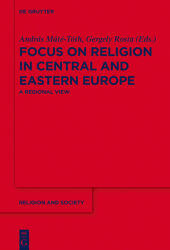 Neuerscheinungen 2016Stand: 2020-02-01 |
Schnellsuche
ISBN/Stichwort/Autor
|
Herderstraße 10
10625 Berlin
Tel.: 030 315 714 16
Fax 030 315 714 14
info@buchspektrum.de |

Andras Mate-Toth, Gergely Rosta
(Beteiligte)
Focus on Religion in Central and Eastern Europe
A Regional View
Herausgegeben von Máté-Tóth, András; Rosta, Gergely
2016. XI, 204 S. 230 mm
Verlag/Jahr: DE GRUYTER 2016
ISBN: 3-11-022811-4 (3110228114)
Neue ISBN: 978-3-11-022811-3 (9783110228113)
Preis und Lieferzeit: Bitte klicken
The series Religion and Society (RS) contributes to the exploration of religions as social systems- both in Western and non-Western societies; in particular, it examines religions in their differentiation from, and intersection with, other cultural systems, such as art, economy, law and politics. Due attention is given to paradigmatic case or comparative studies that exhibit a clear theoretical orientation with the empirical and historical data of religion and such aspects of religion as ritual, the religious imagination, constructions of tradition, iconography, or media. In addition, the formation of religious communities, their construction of identity, and their relation to society and the wider public are key issues of this series.
Different religious groups in Central and Eastern Europe influenced societies in the region after the fall of Communism and continue to play a crucial role in culture, politics, social networks and value transformations. As part of the REVACERN (Religion and Values in Central and Eastern Europe Research Network) project - supported by the EU Sixth Framework Program - more than 70 researchers from 15 countries in the region analyzed and discussed the most important trends in values, religions and religious communities and presented their findings in a comparative way. They tested well-known theories of secularization, nationalism, democracy and pluralism in the colorful region Central and Eastern Europe. This book summarizes their most important findings in seven chapters, addressing religion and its entanglements with geography, values, nationalism, Orthodoxy, education, legal regulation, civil society, social networks, new religious movements and new forms of religiosity. Each chapter also provides a regional overview.
András Máté-Tóth, University of Szeged, Hungary.


